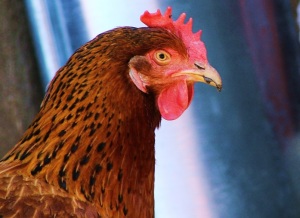It’s certainly true that a vegan diet is cheap, eco-friendly and extremely healthy. For me though, these are added benefits and not the fundamental reasons for choosing animal-free food. The bottom line is that using animals for food causes them to suffer both mentally and physically, all for the sake of products that we don’t need (and are bad for us anyway). By adopting a vegan diet, we can withdraw our financial support from industries that cause this suffering and help to reduce the demand for animal products.
Meat and fish
Many farmed animals spend their lives in squalid, cramped conditions that deprive them of doing most of the things that matter to them. Even if animals are kept according to higher welfare standards (which often leave much to be desired), they will still be killed at a young age and the slaughterhouse is a terrifying and often painful experience. Non-existent or inefficient stunning can result in animals being killed while fully conscious.
I always used to think that fish were exempt from factory farming, but sadly this isn’t the case. Many are reared in overcrowded cages underwater, and both wild and farmed fish face a painful death. Contrary to popular belief, scientists now agree that fish feel pain.
Dairy and eggs
I stopped eating meat as a child but carried on with dairy and eggs until recently. I never really considered how they were produced and what this meant for the animals involved. Just like meat and fish, the production of milk and eggs causes animals to suffer and be killed.
For a cow to continually produce milk, she must keep having calves. Calves are usually separated from their mothers shortly after birth to prevent them drinking the milk intended for sale. This separation causes extreme distress to both mother and calf.
If the calf is male, he will often be killed soon after birth or raised for veal, quite possibly after a gruelling journey to the continent. Most vegetarians shudder at the thought of veal, but the link between veal and dairy farming is undeniable. If the calf is female, she will probably follow in the miserable footsteps of her mother. This means a cycle of pregnancy, birth and separation, producing vast quantities of milk and struggling with painful conditions such as lameness and mastitis. At around 4-5 years old, she will be sent to slaughter (cows can live to be around 25).
Egg production is no more humane. One of the most disturbing practices occurs as soon as the chicks are hatched. Male chicks cannot generate a profit for the egg industry, so are gassed or shredded alive. The future laying hens often have a portion of their beaks removed to prevent feather pecking once the stressful production regime begins. The debeaking procedure is every bit as painful as it sounds.
The traditional battery cage has now been outlawed in the EU, but the ‘enriched’ cages are only marginally better and still prevent the hens from carrying out much of their natural behaviour. Free-range hens are generally kept in large, overcrowded sheds with pop holes that sometimes allow them outside access (if they can push their way through the crowds). At 72 weeks old, the hens will no longer be producing as many eggs. They will be packed into crates and transported to slaughter.
Even a brief description of animal farming makes for distressing reading. Yet these practices can only continue if there is a market for animal products. As consumers, we have the power to reduce this market and the number of animals that suffer as a result. It’s not about striving for ethical perfection or moral superiority, but taking control of the practices you fund through your purchases.
Becoming a vegan is so much easier than it sounds and the internet is packed with advice and support. Every meal, snack and even the tedious food shop will suddenly be helping animals.
Useful websites





